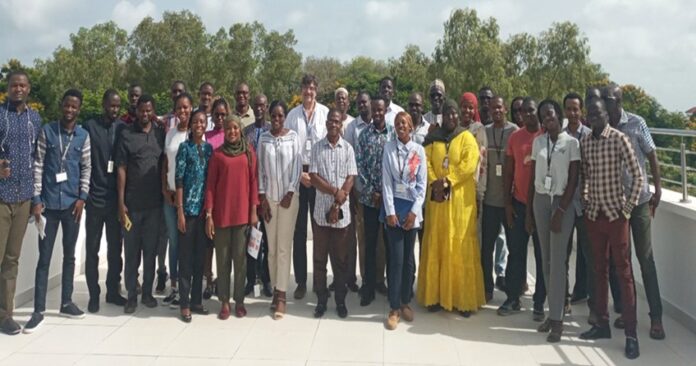By Assan Bah
The Medical Research Council Unit-The Gambia at the London School of Hygiene and Tropical Medicine (MRCG at LSHTM), on 13th July 2022, commenced a ten day ‘bio-informatics’ training course for West African Scientists at the MRC grounds in Fajara.
The opening ceremony was attended by Professor Umberto D’Alessandro; MRCG Unit Director; Karamba Sanyang; Deputy Permanent Secretary at the Ministry of Health, National Public Health Director and Dr. Mustapha Bittaye, the Director of Health Services at the Ministry of Health.
The ten day ‘bio-informatics’ course is expected to teach participants on how to analyse viral genome sequences and interpret genomic data obtained by high-throughput sequencing.
The use of the command line to analyse viral NGS data, quality control of sequences, reference mapping and de novo assembly of viral genomes, pathogen identification from metagenomics data, and creating phylogenetic trees will be covered in the course.
Dr. Abdoul Karim Sesay, the Head of Genomics and Strategy Core Platform at the MRCG at LSHTM, said the training involves seven countries in the Sub region which will increase the capacity for the participants.
“The training will help participants to analyse their Covid data and the strength of Covid that they have in their countries. When they are able to analyse the Covid data, they will be able to analyse Monkeypox data and Lasa Fever data,” Dr Sesay said.
“WAHO, WHO and all the other partners have recognised that every country [should] be able to analyse their own data. It is a pandemic; you need to know what is happening in your country.”
Fatoumatta Sidibeh, a participant and a lab scientist at the Soma District Hospital, said The Gambia doesn’t have the sequencing equipment and as such, they gather all their materials and transport them to the MRC.
“And in doing so we do sometimes have challenges in transporting them,” she said.
Sidibeh further said they had to rely on MRC for sequencing because they were not trained in bioinformatics and do not have the sequencing techniques.
Samuel Sorie, a medical lab scientist from Sierra Leone, said the continent’s public health sector is faced with various challenges that are posed by diseases which are public health concerns.
He expressed optimism that “The genomics is a new technology. It is important that the issue of bioinformatics is because once we do analysis, there is always a step to go forward to carry out the bioinformatics analysis; and currently, we don’t have people in our country that are capable of doing that. To get this opportunity is very important.”
Sponsored by the West African Health Organization (WAHO), the training is hosting 15 laboratory staff from NRLs to MRC Unit The Gambia at LSHTM. The overarching objectives of the award from WAHO is to build the capacity of National Reference Laboratories (NRls) in ECOWAS Countries including Sierra Leone, Liberia, Mali, The Gambia, Guinee, and Guinee Bissau on genomic sequencing of infectious diseases pathogens and contribute to some reagents purchase.





















